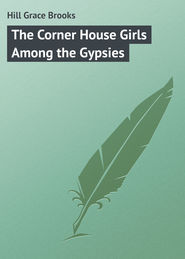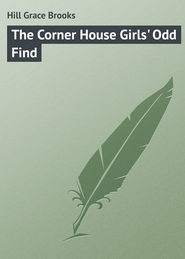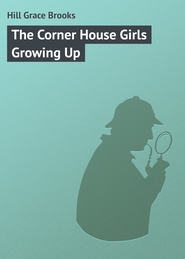По всем вопросам обращайтесь на: info@litportal.ru
(©) 2003-2024.
✖
The Corner House Girls in a Play
Настройки чтения
Размер шрифта
Высота строк
Поля
They drove on by the road that led past Lycurgus Billet's. The tumbled-down house looked just as forlorn as ever, its broken windows stuffed with old hats and gunny-sacks and the like, its broken steps a menace to the limbs of those who went in and out.
Mrs. Lycurgus was picking up chips around the chopping-block and was not averse to stopping for a chat. "No, Lycurgus ain't here," she drawled. "He's gone huntin'. This yere's the first day the law's off'n deer an' Lycurgus 'lows ter git his share of deer-meat. He knows where there's a lick," and she chuckled in anticipation of a full larder.
"Sue? Naw, she ain't here nuther. Mrs. Buckham – her that's the invalid – has sorter took a fancy ter Sue. She's been a-stoppin' there at that Strawberry Farm, right smart now.
"You goin' there? Then you'll likely see her. She likes it right well; but she's a wild young 'un. I dunno's she'll stand it for long."
"Don't you miss her?" asked Agnes, as Neale prepared to drive on.
"Miss Sue? My soul!" ejaculated Mrs. Billet, showing a ragged row of teeth in a broad smile. "Dunno how I could miss one young 'un! There's a-plenty others."
At the Buckham farm little Sue Billet was much in evidence. She was tagging right after the old farmer all the time, and it was plain whose companionship it was that made the half-wild child contented away from home.
The farmer was hearty in his greeting, and he insisted that the visitors go right in "to see marm."
"Wipe yer feet on the door-mat," advised the old man. "Me and Sue haster, or else Posy'll put us out. I never did see a gal with sech a mania for cleanin' floors as that Posy gal."
The invalid in her bower of bright-colored wools welcomed Agnes warmly. "Here's my pretty one! I declare you are a cure for sore eyes," she cried. "And how are the sisters? Why didn't they come to-day?"
Neale remained outside to speak with Mr. Buckham for some minutes. The old farmer, with his silver-bowed spectacles on his nose looked hard at the letter Neale had brought.
"Not that I kin read it," he said ruefully, "or could if it was writ in letters of gold. But I kin see it ain't marm's hand of write – no, sir."
"I was very sure of that," Neale said quickly. "Let me read it to you, sir. You see it's written on your own stationery."
"I see that," admitted the farmer. "Oh, yes; I see that."
Neale began:
"'Mr. Curtis G. Marks,
"'Principal Milton High School.
"'Dear Sir: Mr. Robert Buckham wishes to bring to your attention the fact that on May twenty-third last, a party of your girls, including the members of the first basket ball team, on their way home from Fleeting, were delayed by an accident to the car, right beside his strawberry field; and that the girls named below entered the field without permission, and picked and ate a quantity of berries, beside destroying some vines. Mr. Buckham wishes to call your serious attention to the matter and may yet take steps to punish the culprits himself.'"
Then followed the names of all the girls whom Mr. Marks considered it his duty to punish. There was no signature at all to the letter; but it purported to come from the old farmer, and to be written at his instance.
"I dunno as ye kin call it forgery," muttered Mr. Buckham; "but it's blamed mean – that's what it is! It gives me a black eye with these gals, and the gals a black eye with the teacher. Sho! it's a real mean thing to do."
"But who did it?" demanded Neale, earnestly.
"Ya-as! That's the question," returned Mr. Bob Buckham. "If we knowed that – "
"Are you sure we don't know it?"
The old man eyed him contemplatively. "You suspect somebody," he said.
"Well! and so do you," declared the boy, warmly. "Only you've got some evidence, and we haven't."
"Humph!"
"You must know who would have a chance to get your letter paper and write such a letter as that?"
"Humph!" repeated the old man, reflectively.
"I don't know how that girl came to be out here. But you know you saw her – and like enough she spoke of the strawberry raid – and she went in to see Mrs. Buckham – and she saw the writing paper – "
All the time that Neale was drawling out these phrases he was watching the old farmer's grim face keenly for some flicker of emotion. But it was just as expressionless as a face of stone.
"It's fine weather, we're having, Neale," said Mr. Buckham, finally.
At that the boy lost his temper. "I tell you it's a mean shame!" he cried. "Poor Aggie can't act in that old play, and she wants to. And Trix Severn is spoiling the whole show, and she oughtn't to be allowed to. And if she was the cause of making all these other girls get punished, she ought to be shown up."
"Let's see that letter agin, son," said the old man, quietly. He peered at the handwriting intently for a minute. Then he said, with perfectly sober lips but a twinkle in his eye:
"Ye sure marm didn't write it?"
"Just as sure as I can be! I know her handwriting," cried Neale. "You're fooling."
"So all handwriting don't look alike, heh?" was the farmer's final comment, and he returned the letter to the boy's care.
Neale looked startled for a moment. Then he folded the letter carefully and put it away in his pocket. On the way home he said to Agnes:
"Say, Aggie!"
"What is it?"
"Can you get me a sample of Trix Severn's handwriting?"
"What?" gasped Agnes.
"Just something she's written – a note, or an exercise, or something."
Agnes stared at him in growing horror. "Neale O'Neil!" she cried.
"Well?" he demanded gruffly.
"You're going to try to put that letter upon her – you are going to try to prove that she made all this trouble."
"Well! what if?" he asked, still without looking at her.
"Never! Never in this world will I let you do it," said Agnes, firmly.
"Huh! And I was only trying to see if there wasn't some way out of the mess for you," said Neale, as though offended.
"I wouldn't want to get out of it – even if you could help me – at such a price. Because she may have been a tale-bearer, do you think I'd be one?"
"Not even to get a chance to act in The Carnation Countess?" asked Neale, with a sudden smile.










